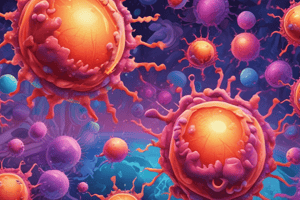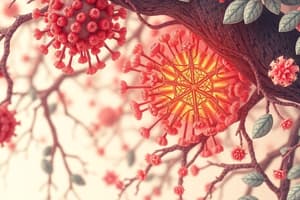Podcast
Questions and Answers
What role do tumor antigens play in cancer diagnosis?
What role do tumor antigens play in cancer diagnosis?
Indicators for cancer presence and progression
Which of the following are examples of tumor antigens used in blood tests? (Select all that apply)
Which of the following are examples of tumor antigens used in blood tests? (Select all that apply)
- HER2 for breast cancer
- CEA for colon cancer (correct)
- CA-125 for ovarian cancer (correct)
- PSA for prostate cancer (correct)
Tumor antigens can only induce humoral immune responses.
Tumor antigens can only induce humoral immune responses.
False (B)
Which of the following is a type of therapeutic application involving tumor antigens?
Which of the following is a type of therapeutic application involving tumor antigens?
What techniques are used to discover tumor antigens?
What techniques are used to discover tumor antigens?
What are tumor-specific antigens (TSAs)?
What are tumor-specific antigens (TSAs)?
Match the following types of tumor antigens with their descriptions:
Match the following types of tumor antigens with their descriptions:
Flashcards are hidden until you start studying
Study Notes
Tumor Antigen
Diagnostic Biomarkers
- Tumor antigens serve as indicators for cancer presence and progression.
- Used in blood tests (e.g., PSA for prostate cancer, CA-125 for ovarian cancer).
- Facilitate early detection and monitoring of treatment response.
- Specificity and sensitivity are crucial for effective diagnostic applications.
Therapeutic Applications
- Tumor antigens are targets for immunotherapy, such as:
- Monoclonal antibodies (e.g., trastuzumab targeting HER2).
- Cancer vaccines (e.g., sipuleucel-T for prostate cancer).
- CAR T-cell therapies targeting specific antigens (e.g., CD19).
- Enhance immune system's ability to recognize and destroy cancer cells.
Tumor Antigen Discovery
- Techniques include:
- Genomic and proteomic profiling to identify unique surface proteins on tumor cells.
- Use of high-throughput sequencing and bioinformatics.
- Identification of neoantigens arising from tumor mutations.
- Focus on finding antigens that elicit strong immune responses.
Immune Response To Tumor Antigens
- Tumor antigens can induce both humoral (antibody-mediated) and cellular (T-cell mediated) immune responses.
- Immune evasion mechanisms by tumors include:
- Downregulation of antigen presentation.
- Secretion of immunosuppressive factors.
- Induction of regulatory T cells.
- Effective therapies aim to overcome these barriers to enhance immune response.
Types Of Tumor Antigens
-
Tumor-Specific Antigens (TSAs):
- Unique to cancer cells, not found on normal cells (e.g., mutated proteins).
-
Tumor-Associated Antigens (TAAs):
- Present on both tumor and normal cells, often overexpressed in tumors (e.g., HER2, CEA).
-
Neoantigens:
- Result from tumor-specific mutations; highly immunogenic and personalized.
-
Viral Antigens:
- Associated with virus-induced cancers (e.g., HPV antigens in cervical cancer).
-
Oncofetal Antigens:
- Normally expressed during fetal development but re-expressed in tumors (e.g., alpha-fetoprotein, AFP).
Diagnostic Biomarkers
- Tumor antigens are crucial indicators for detecting cancer and monitoring its progression.
- Blood tests utilize tumor antigens, such as PSA for prostate cancer and CA-125 for ovarian cancer.
- Early detection of cancer and assessment of treatment effectiveness are facilitated by these biomarkers.
- High specificity and sensitivity of tumor antigen tests are essential for successful diagnostics.
Therapeutic Applications
- Tumor antigens are primary targets in various immunotherapy approaches.
- Monoclonal antibodies like trastuzumab specifically target HER2 protein in breast cancer treatment.
- Cancer vaccines, such as sipuleucel-T, are designed to stimulate an immune response against prostate cancer.
- CAR T-cell therapies target defined antigens, exemplified by CD19 in certain blood cancers.
- These therapies enhance the immune system's ability to recognize and eliminate cancer cells.
Tumor Antigen Discovery
- Genomic and proteomic profiling techniques identify unique proteins on tumor cell surfaces.
- High-throughput sequencing and bioinformatics play significant roles in the discovery process.
- Neoantigens, which arise from mutations specific to tumor cells, are a primary focus due to their strong immune response potential.
- The aim is to identify antigens that elicit robust immune reactions for effective targeting.
Immune Response To Tumor Antigens
- Tumor antigens can trigger both antibody-mediated (humoral) and T-cell mediated (cellular) immune responses.
- Tumors employ immune evasion strategies to avoid detection, including:
- Downregulation of antigen presentation to immune cells.
- Secretion of factors that suppress immune responses.
- Induction of regulatory T cells that inhibit immune activity.
- Therapeutic strategies aim to counteract these immune evasion mechanisms to strengthen immune responses against tumors.
Types Of Tumor Antigens
- Tumor-Specific Antigens (TSAs): Exclusive to cancer cells, often arising from mutated proteins and not present on normal cells.
- Tumor-Associated Antigens (TAAs): Found on both tumors and normal cells, frequently overexpressed in cancer (e.g., HER2, CEA).
- Neoantigens: Result from specific mutations in tumors; recognized as highly immunogenic and pivotal for personalized therapies.
- Viral Antigens: Linked to cancers associated with viruses, such as HPV in cervical cancer.
- Oncofetal Antigens: Normally expressed during fetal development but reappearing in certain tumors, such as alpha-fetoprotein (AFP).
Studying That Suits You
Use AI to generate personalized quizzes and flashcards to suit your learning preferences.




